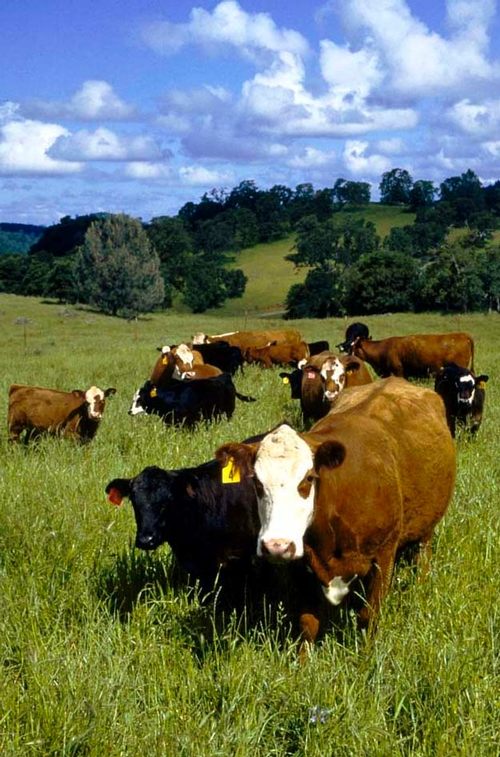Posts Tagged: Williamson Act
Loss of Williamson Act would threaten wildlife habitat
California’s premier farmland protection tool – the Williamson Act – is on the state’s budget-cutting chopping block and with it critical habitat needed for conservation.
A UC Davis study completed by a team of graduate students working with rangeland watershed specialist Ken Tate and other faculty found that 43 percent of the 10 million acres of “non-prime” land in the program, used primarily for cattle grazing, is also critical for statewide conservation goals. Conservation status was determined by the California Rangeland Conservation Coalition, a voluntary partnership between ranchers, environmentalists, government agencies, and others working to preserve and enhance the state’s rangeland areas.
For nearly 50 years the Williamson Act has provided private landowners with tax breaks in exchange for an agreement to keep land in agricultural or open space use for a specified period of time. The state compensated counties for the reduced property tax revenue but cut these subsidies in 2008 and again in 2009. Legislation passed in October (Assembly Bill 2530) allows counties to voluntarily implement modified contracts for reduced terms but does not ensure continuation of the Williamson Act beyond 2015.
To understand how loss of the Williamson Act would affect ranchers and the environment, the researchers surveyed 700 members of the California Cattlemen’s Association in 2010. Their findings confirmed what many in the industry already know: ranching is a low-profit industry. Seventy percent of surveyed ranchers made less than $10,000 in 2009 and less than half reported making a profit. Seventy-two percent of the ranchers surveyed consider the Williamson Act to be “extremely important” to their operations.
Survey results also show that loss of Williamson Act funding at the state level would put critical habitat at risk for development. Forty-two percent of the surveyed ranchers said they would sell some or all of their rangeland without the tax relief. Fifty-six percent of the ranchers predict their sold land would be developed for non-agricultural uses.
“California’s rangelands provide clean drinking water, wildlife habitat, open space, and sequester carbon among many other critical ecosystem services,” Tate says. “We need tools such as the Williamson Act to conserve this important landscape.”
Study authors include doctoral students Sarah Myhre, Iara Lacher, Will Wetzel, Dale Manning, and Dan Swezey. They were participating in a collaborative project for an “IGERT” traineeship focused on rapid environmental change. The program is funded by the National Science Foundation. A concise policy brief on the survey was published in October 2010 and includes an illustrated map of the areas that could be affected by the demise of the Williamson Act. The policy brief and additional information about the program is available online at http://reach.ucdavis.edu/programs/williamsonact.html.
State budget puts Williamson Act in jeopardy
Enacted in 1965, the Williamson Act has allowed many of the state's farmers to stay in the agriculture business instead of selling their property for development. Under the act, rural land owners commit to keeping their property in farming for 10 years and, in exchange, receive a property tax break. The state reimbursed county governments from the state general fund for money lost to the tax break.
However, because of the budget crisis, the state is considering suspending the reimbursements, according to an column by freelance writer Don Curlee. In the story, Curlee outlined an article that appeared recently in California Agriculture journal by UC Davis Cooperative Extension public policy specialist emeritus Alvin Sokolow titled "Outlook: Budget cuts threaten the Williamson Act, California's longstanding farmland protection program."
Sokolow, who has monitored the effect of the Williamson Act since its inception, considers the legislation a successful case of converging public and private interests, achieving long-term land conservation while helping the economic bottom line of farmers and ranchers.
Sokolow believes time for resolving the issue by preserving the state's participation is running out. Without fiscal assistance, most counties with substantial acres in the program probably would pull out through contract nonrenewals. If the contracts aren't renewed, urban development on Williamson Act lands may begin in nine years.

The Williamson Act has protected farmland from development for 45 years.
UCCE plays role as county grapples with cuts
University of California Cooperative Extension will be at the table with the Tulare County farm bureau, farmers, county supervisors and others as the Tulare County Resource Management Agency looks for ways to preserve farmland without the Williamson Act, according to an article in the Porterville Recorder.
The story said 6,611 Williamson Act contracts are in place in Tulare County, affecting 35 percent of county land.
Because of the difficult budget times, the state cut funding for the Williamson Act, which provided tax benefits to farmers who agreed to keep their land in agriculture for set periods of time.
RMA is holding a stakeholder meeting Aug. 19 to establish direction for county supervisors in the absence of Williamson Act funding. Attendance is expected from groups like the Tulare County Farm Bureau and the University of California Cooperative Extension—Tulare County, the article said.
I'll be out on vacation a few days, but next Tuesday will bring the ANR News Blog up to date.



